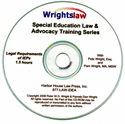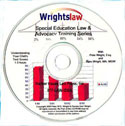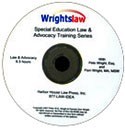|
|
This week at Wrightslaw our inbox was full of questions about IEPs.
Back by popular demand, we will continue taking A Closer Look at IEPs.
Do any of these questions and concerns sound familiar?
- My child was found eligible for an IEP, what happens next?
- Who actually develops the IEP?
- Can my child's IEP be changed or revised?
- Can I get any training so that I can help my child more?
In this issue of the Special Ed Advocate we will provide answers to your FAQs about IEPs and resources you can use for more information. Don't miss the free pubs about IEPs- you'll find them in the last section!
Don't hesitate to forward this issue to other families, friends, and colleagues.

Sign up free today! l Read previous issues |
|
| Who IS Responsible for Providing an Appropriate IEP? |
The IEP must be designed to enable the child to be involved in and make progress in the general education curriculum. 20 U.S.C. 1414(d)
What happens when your child does not make any progress?
One parent asks if FAPE is the parent's responsibility.
"My daughter has made little or no progress after years of special education. Her IEPs contain vague subjective goals and objectives. If our case goes to due process, is the school liable for not providing an appropriate education? Or, is this the responsibility of the parent who signed the IEP?"
Find out Who IS Responsible for Providing an Appropriate IEP?
Do you have concerns about your child's IEP?
In this article, Who is Responsible for Providing FAPE? How to Document Your Concerns on IEPs, Tape Recordings and Letters, you will also find out how to document these concerns and indicate your disagreement with the IEP. |
back to the top |
|
| Why, When, and How Can I Get My IEP Revised? |
Would you ask your children to wear the same shoes year after year? Their feet grow and change. So do their needs in school.
You can request that an IEP be changed at any time. Find out how. Read How Can I Get My Child's IEP Revised?
Consenting to an IEP does not mean you are stuck with it - or that it will be appropriate for an entire year.
It's time to find out what the law and regulations say about revising IEPs. |
back to the top |
|
Training for Parents and Teachers - A Key to Success in IEPs |
Are you beginning to panic because your child is making no progress and his teacher thinks he just isn't trying?
Perhaps the problem is that the teacher isn't trained to provide the assistance your child needs.
Your child's IEP can and should provide this training for his teacher - and for you as a parent.
Read Support For School Personnel and Parent Training:
Often Overlooked Keys To Success
Did you know...?
The Department of Education states that there should be “no question that parent counseling and training include helping parents acquire skills that will help them support the implementation of their child’s IEP or IFSP”
In this article you'll find some excellent examples of how these types of IEP services can be implemented.
Annie's in the third grade. Find out how her teacher (and her mom) can get training from the speech therapist.
Lisa is 12 years old. Find out how Lisa's regular ed teacher (and her mom) can get training about auditory processing difficulties in order to help Lisa learn more effectively.
What kind of supports and supplementary services would help your child be more successful?
The IEP should contain a statement of these services and clearly designate who is responsible for the training. Read more. |
|
back to the top
|
|
| Even More IEP FAQs |
Do you have more questions? Here's an article that will answer many questions about your child's IEP.
Go to Frequently Asked Questions About Individualized Education Programs (IEPs)
For more information, articles, and resources about IEPs, visit the Wrightslaw IEP Page.
|
|
back to the top
|
|
| Free Pubs: A Model Form for the IEP- and more |
The Federal Regulations (34 CFR §§300.320-300.328) specify the procedures that school districts must follow to develop, review, and revise the IEP for each child.
The Model Form: IEP describes required elements in the IEP including present levels of academic achievement and functional performance and measurable annual goals.
A Guide to the Individualized Education Program published by the U. S. Department of Education. This guide was developed by the U.S. Department of Education, with the assistance of the National Information Center for Children and Youth with Disabilities (NICHCY). |
|
back to the top
|
|
|








